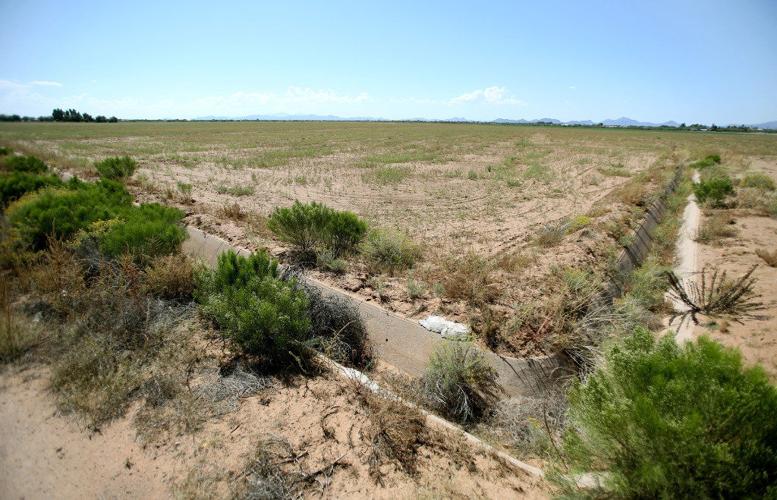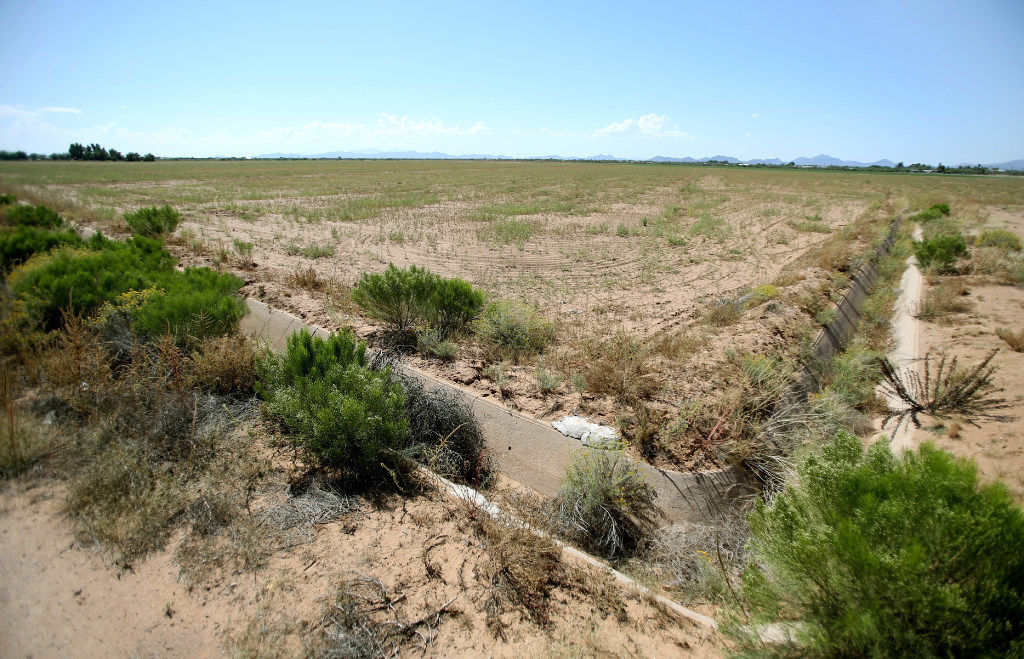Biotech seed giant Monsanto and Pima County are negotiating a possible incentive package that would substantially reduce the property tax burden of a planned Monsanto greenhouse in the Avra Valley.
The basis on which the greenhouse parcel’s tax bill is determined would be reduced by two-thirds under the proposal.
A statewide tax research group opposes such incentives as unfair to other taxpayers, but County Administrator Chuck Huckelberry says that in the long run, business incentives can reduce other taxpayers’ burdens. The new business, in this case Monsanto, would still bring in significant additional tax revenue.
The Arizona Tax Research Association says, however, that the state should lower tax-assessment ratios for all property owners rather than give some companies tax breaks, which it calls picking “winners and losers.”
An environmental activist group, Rising Tide Tucson, has announced it will fight tax breaks for Monsanto.
EMAILS REVEAL DETAILS
Pima County officials had kept details of the incentive discussions under wraps.
But information about the Monsanto proposal — including the Avra Valley location — surfaced last week through email exchanges between PriceWaterhouseCoopers LLP officials, representing Monsanto, and Pima County Joint Technical Education District, a technical-educational program.
Monsanto has offered to invest $100 million in the greenhouse and hire 30 to 60 people to work there, said an email from a Monsanto representative to JTED.
Monsanto is shopping the proposal to JTED and two other educational institutions whose property tax revenues could be reduced by a tax break for the seed company: Pima Community College and the Marana School District.
The greenhouse, where corn and soybean seeds would be grown for research purposes, would be built in unincorporated Pima County along Twin Peaks Road just west of Marana. Monsanto officials hope to start construction by the end of this year.
The parcel where the greenhouse would be built is currently owned by the Kai farming family, according to the County Assessor’s Office.
Typically, an Arizona farming operation’s property-tax bill is based on an assessed value worth 15 percent of the parcel’s full cash market value. The incentive package would place the assessed value at 5 percent of full value.
For Monsanto to qualify for the tax incentive, Pima County would have to put the greenhouse parcel into a federally designated foreign trade zone. Such zones operate under authority of the U.S. Department of Commerce.
In a foreign trade zone, which already exists in Pima County but would have to be expanded, companies use special procedures that also allow reduced tariffs on foreign merchandise, minimized processing fees and expedited transport of goods from ports of entry.
Any tax breaks for companies operating inside such a zone must be approved locally.
To get federal approval for the trade zone designation, Monsanto must also obtain letters from affected school districts saying they don’t object to it, PriceWaterhouse senior tax associate Sharvil Sheth wrote in an email last month to Tina Norton, JTED’s assistant superintendent and chief financial officer. The two exchanged several emails over the proposal in the past month, public records show.
JTED’s Governing Board will discuss the Monsanto foreign trade zone proposal at its Oct. 18 meeting.
COUNTY EXPERTISE CITED
In 2015, the JTED board approved a similar trade zone proposal for a HomeGoods distribution warehouse inside the city of Tucson.
“We do routinely approve these things. We rely on the county for their expertise on economic development,” JTED spokesman Greg D’Anna said. “If it’s going to bring in jobs, that usually outweighs the tax revenue we would receive anyway. When the county asks us, we don’t question their expertise in economic development. We usually take their word.”
Typically, when such tax abatements are given, the state picks up the difference, Norton said.
Huckelberry said he would recommend that Monsanto give all three school districts some aid to make up the difference from any tax revenues that are lost, if necessary.
A Monsanto spokeswoman and two officials for PriceWaterHouseCoopers, which has represented Monsanto in local negotiations , declined last week to discuss the negotiations .
“As part of Monsanto’s due diligence process, our representatives are meeting with various community leaders, along with different permitting authorities. Details on those conversations haven’t been made public,” said Christi Dixon, a spokeswoman for the St. Louis-area company. “We look forward to sharing more information with the community when we can.”
Marana School District Superintendent Doug Wilson said his staff met with two PriceWaterhouse officials on Sept. 22 at district offices and have planned another conversation with the company.
Wilson wasn’t ready to take a stance on the tax breaks yet but said that if Monsanto is going to operate inside school district boundaries, “We want to make sure our kids benefit from that partnership.” Science classes or student internships involving Monsanto could be examples of such benefits, he said.
The national environmental issues that activist groups have raised about Monsanto are “not necessarily on our radar screen,” Wilson said.
“When we first heard of this, I went out and talked to ... two or three farmers in our community and they were all supportive. It was really a benefit from a seed standpoint for them to be able to do experiments with Monsanto. ... They were more drought-resistant and disease-resistant. I didn’t hear the other side. The key for some of our farmers is to make sure that they have seeds and a higher yield.”
SECRECY, concerns
on the ENVIRONMENT
Rising Tide Tucson says its opposition to the tax incentives will be based on what activists view as Monsanto’s poor track record on issues such as the health impacts of Roundup, an herbicide commonly used to kill weeds and other invasive plants, particularly in farm fields.
The World Health Organization has declared Roundup a probable human carcinogen, but Monsanto has challenged that assessment, and the U.S. Environmental Protection Agency is now reviewing the issue.
Activists say Monsanto’s widespread use of genetically modified seeds and its opposition to mandatory labeling of foods with GMOs will also become issues here, although the company has said it will use predominantly non-GMO seeds in its Avra Valley greenhouse.
Martha Dominguez of Rising Tide Tucson said, “I want to make sure that the (county) supervisors hear from citizens who feel, number one, that this contract with Monsanto is being done in secrecy.
“What is a government official doing signing contracts with private organizations, especially companies like Monsanto?” asked Dominguez, whose group is affiliated with a global Rising Tide organization that has lobbied on climate change and other social and environmental issues.
Huckelberry, however, made it clear Friday that he doesn’t think Monsanto’s national record should be an issue here. He said he believes its local environmental impacts will be minimal.
“My impacts are traditional land-use impacts — air quality, traffic, water use,” he said. “GMOs, that’s not our issue of interest or specialty. It’s pretty irrelevant to this discussion because we have no regulatory authority over agricultural production. It’s all been taken away by the state.”
TAX IMPACTS DEBATED
One reason Pima County has to give big incentives to attract companies such as Monsanto is that its property tax rates for businesses are high on a national scale, said Arizona Tax Research Association senior analyst Sean McCarthy.
In another example of a county economic development incentive, Pima County supervisors approved an economic development agreement in January to spend $14.5 million on a corporate headquarters and manufacturing facility for World View Enterprises, and another $500,000 on a balloon launch pad for World View.
McCarthy cited a 2015 study from two nonprofit groups that showed Pima County ranked high nationally on various classes of business-related property tax rates. The study was prepared by the Lincoln Institute for Land Policy and the Minnesota Center for Fiscal Excellence.
McCarthy’s arguments miss the point, Huckelberry countered.
Assume vacant farmland is valued at $1,000 per acre and that the owner pays property taxes using the 15 percent assessment basis. That produces about $800 worth of county property taxes, he said.
Now, consider another property that’s improved with $100 million worth of capital investment and pays property taxes based on assessments valued at 5 percent of the property’s full cash value, he said. Such a parcel would be about $200,000 in county property taxes, allowing other county taxpayers to pay less, Huckelberry said.
Huckelberry cautioned that he’s not ready to formally recommend the package and that a proposal won’t come to the Board of Supervisors until November or December. Asked if he thought the county and Monsanto are close to agreement on incentives, Huckelberry replied that he didn’t know and referred the question to Monsanto.
“Anything that expands the tax base (means) that other taxpayers pay less,” Huckelberry said. “Under those circumstances, I would obviously be favorably inclined to recommend it to the board.”








